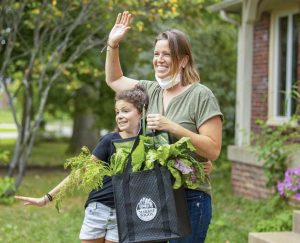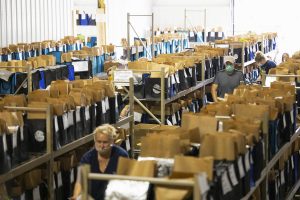Online marketplace opens door for farm-fresh food deliveries
By Kay Shipman FarmWeek — January 8, 2022
Market Wagon customers receive their orders of local farm produce delivered right to their homes. The online ordering and delivery service grew tremendously during the pandemic to fill farmers’ and consumers’ needs. (Photo courtesy of Market Wagon)
A farmer supplier describes Market Wagon as DoorDash for farm products. The company’s CEO and co-founder explains his idea as an online farmers market that delivers to shoppers’ homes. From both farmers’ and consumers’ perspectives, Market Wagon fills pandemic-driven needs, supports the popularity of online shopping and offers one answer to supply chain problems.fresh
Based in Indianapolis, Market Wagon offers consumers an online market of local farm products delivered to their homes and offers farmers an online wholesale market for and delivery service of their products. Currently in Illinois, Market Wagon distributes in three locations — the Chicago area, metro St. Louis and 16 central Illinois counties.
Central Illinois farm supplier Ropp Jersey Cheese of McLean County has sold products through Market Wagon for about a year. “It’s like another wholesale account for me,” dairyman Ken Ropp said. “They handle all the deliveries and everything. Market Wagon is great to track all the business; everything is customized up to the minute. It (Market Wagon) enters a customer base that I might not otherwise.”
Ropp explained he delivers dairy products from his Normal farm to the company’s Bloomington-Normal hub. He knows of another farm source that delivers to two hubs.
Market Wagon’s CEO and co-founder Nick Carter, who grew up on an Indiana farm, explained local farm vendors bring their products to company fulfillment centers in their respective delivery area.
Asked what is important to the company, Carter said, “No. 1 is local (farm) transparency. Shoppers know what they’re getting and who raised it. They can chat and ask questions with farmers on the (company online) platform.”
Shoppers order items a la carte and pay no subscription fee. “You can buy what you want, when you want it,” he noted. Customers are charged a flat delivery fee to homes located within the hub delivery area.
Market Wagon does not restrict farm vendors from using any specific production methods. “It’s not all organic or grass-fed,” Carter said. The company requires vendors to be inspected and legally licensed for their respective production, such as a Grade A dairy permit or a state egg license.

Market Wagon employees assemble online customers’ orders of local farm products at one of the company’s warehouses. Local farmer suppliers deliver their products to their local company hub for delivery to shoppers’ homes. (Photo courtesy of Market Wagon)
Ropp explained Market Wagon takes a percentage off the top of a vendor’s sale. In his dairyman view, Market Wagon featured a lot of seasonal fresh produce, and his sales declined when the produce sales decreased.
“Lately, we’ve seen the (sales) numbers tick back up. That means to me more families [were] getting back together for the holidays,” Ropp said.
Farmers and families drove Market Wagon’s growth explosion. When the pandemic started, the company was in six markets. Only 18 months later, Market Wagon was selling and delivering in 15 Midwestern and Eastern states after opening 27 new centers in a year.
The pandemic made online food ordering and delivery “normal,” according to Carter. While consumers had limited access to food sources, farmers who sold directly lost their markets when restaurants, farmers markets and other direct outlets closed. Market Wagon provided farmers an outlet to sell their production, Carter continued.
“We grew by leaps and bounds. It was overwhelming at first,” Carter said. “We realized this was why we’re here. It’s been incredible.”
After massive growth, Market Wagon’s geographic expansion will be slow, according to Carter. The company’s plan is to be nationwide by 2025.
The CEO projected local food sources offer one solution to the breakdown of supply chains.
“All those supply chain issues don’t impact us,” Carter said. “Buying local is the solution to supply chain issues. The most stable and secure supplies are right in our local communities.”
This story was distributed through a cooperative project between Illinois Farm Bureau and the Illinois Press Association. For more food and farming news, visit FarmWeekNow.com.







